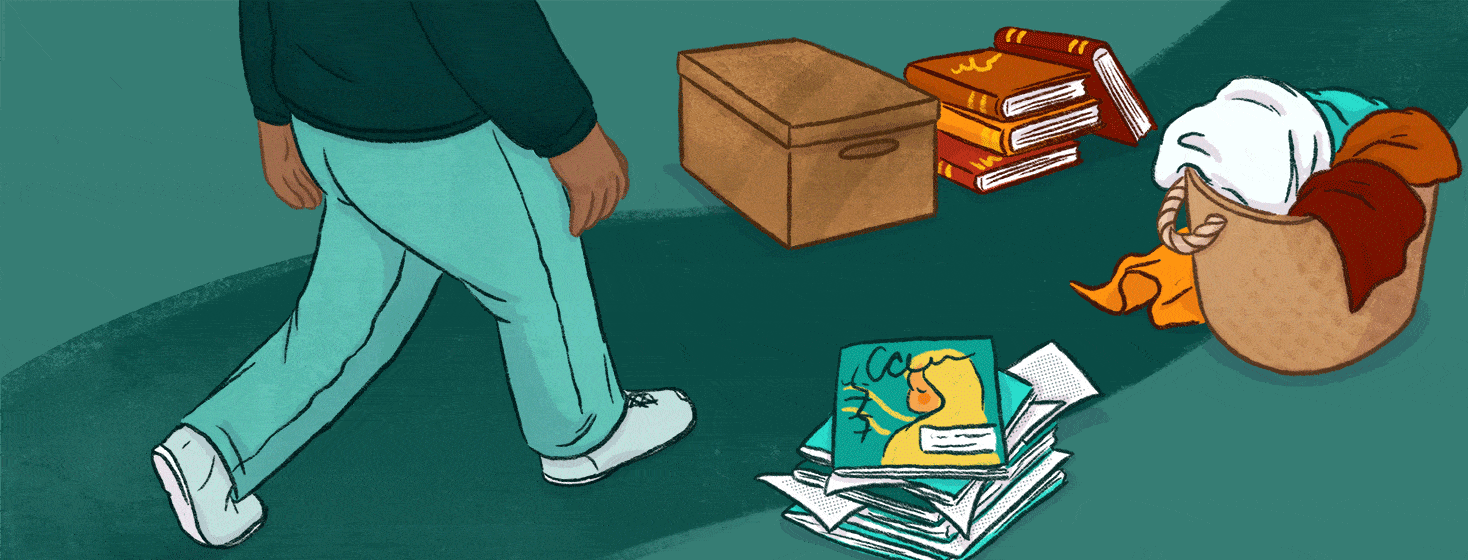Minimizing Clutter for Alzheimer's
I've always been a sentimental person, and the things in my life hold memories of cherished experiences. As a caregiver for my mom, who lives with Alzheimer's, I especially want to cling to the memories as my loved one slips away.
So it can be difficult to embrace the ideas of minimalism and being clutter-free, those hot topics in our culture today. But I've found that they can be practical for helping our loved ones with dementia.
When my mom was living at home, when she lived with my family and me, and when she moved into an independent senior living home, we saw real benefits for my mom when we pared back her things and kept clutter to a minimum.
Reducing clutter in a home full of memories
My childhood home was the home my mom also grew up in. When Mom started showing signs of dementia, we were overwhelmed by a lifetime of stuff in closets, drawers, and cabinets.
Anyone who has lived in a big house can relate to the cycle of cleaning things out, and then somehow, stuff inevitably piles up again. Add to that a disease that starts wearing away brain functions necessary for the organization, and you have a recipe for clutter.
The hazards of clutter
People living with dementia can be overstimulated by a lot of clutter, and it can make it hard for them to process information. It can also make it difficult to find what they're looking for, remember a sequence of tasks, or focus on an activity they're doing.1
Clutter is also a safety hazard. It can make walking unsafe, pose a fire hazard, or make the living conditions unsanitary.
Every visit, I made sure to walk through the house and clean up as much as I could. I would clear out drawers and cabinets in rooms. Mom didn't use it anymore, only to return and find them filled up again. I started adding notes in the empty drawers that said, "Keep Empty!" It didn't help.
All of the paper
Mom also started having major trouble with paper. We'd come over, and piles of mail, receipts, and catalogs would be all over the house. She couldn't sort through them anymore, so important bills were mixed in with junk. This is common for some people with dementia as they lose the ability to recognize what should be thrown out.1
I tried to cancel as many subscriptions as I could simply to reduce the amount of paper coming in.
In addition, Mom did not like to throw anything away. I learned to take out the trash before I left because sometimes she would retrieve things from the trash can and keep saving them. We saw dementia slowly reaching into all these areas of her life.
A move is a good excuse to downsize
Once our family decided with Mom to have her come live with me and my family, we knew we'd have to pare down most of her belongings.
We made sure special things and important furniture came with her and all her valuables and clothing. And while we kept photographs and sentimental items, many of her things were donated or put in storage.
It was a hard change for Mom, and dementia made decision-making hard for her. Much of it we had to do without her there, to spare her from the stress and pain. But to our great relief, the forgetfulness of dementia gave us a moment of grace, and Mom did not miss the things that stayed behind.
The few things that stuck out to her - a special coffee mug, filters for her water pitcher, and a bottle of local olive oil - were easily mailed to her by a family member.
Keeping mom comfortable
Mom was comfortable in a spacious apartment in our home, with a large closet and private bathroom. But we made sure the room would be easy to clean, so some of her belongings stayed packed in boxes in case she asked for them. (She didn't ask.)
The paper still piled up, but now I was able to help her keep the clutter at bay. While I regularly cleaned her room, I tried to only focus on safety.
According to the Alzheimer's Association, the items someone with dementia collects give them a sense of safety and security. Things that seem useless or worthless to others might hold emotional value.2
I left a few small areas of sentimental items in a drawer so she could still go through special things, like cards from friends and family stacked on the coffee tables and photographs and theater programs.
Less clutter is best for dementia
After Mom had a few falls and injuries, she couldn't navigate the stairs in our home anymore. We knew it was time to move to an independent living home.
We followed a similar protocol, packing everything special and useful to her but leaving a percentage of it behind again. Her new apartment was similar to her space at our house, but we didn't want to fill every drawer and closet, knowing that less clutter would be better for the cleaning staff and Mom.
She is living happily in her new space, and I still go regularly and help through the clutter and detail-clean. Recently I removed half of the clothes in her closet because she only wears a couple of different outfits now, and the full closet was becoming overwhelming.
We still love the nostalgia and memories that some of our keepsakes bring us. But a clutter-free mindset has enormously helped my mom in all the different caregiving stages we've found ourselves in. And it's teaching my family and me how to prepare well for the future, too, by reducing the clutter in our own life.

Join the conversation